Related Research Articles

Animal Farm is a satirical allegorical novella, in the form of a beast fable, by George Orwell, first published in England on 17 August 1945. It tells the story of a group of anthropomorphic farm animals who rebel against their human farmer, hoping to create a society where the animals can be equal, free, and happy. Ultimately, the rebellion is betrayed, and under the dictatorship of a pig named Napoleon, the farm ends up in a state far worse than before.

Eric Arthur Blair was a British novelist, poet, essayist, journalist, and critic who wrote under the pen name of George Orwell, a name inspired by his favourite place River Orwell. His work is characterised by lucid prose, social criticism, opposition to all totalitarianism, and support of democratic socialism.
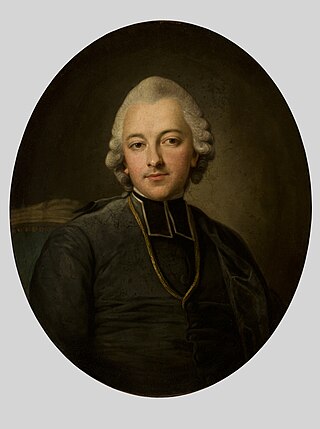
Political fiction employs narrative to comment on political events, systems and theories. Works of political fiction, such as political novels, often "directly criticize an existing society or present an alternative, even fantastic, reality". The political novel overlaps with the social novel, proletarian novel, and social science fiction.

Keep the Aspidistra Flying, first published in 1936, is a socially critical novel by George Orwell set in 1930s London. The main theme is Gordon Comstock's romantic ambition to defy worship of the money-god and status, and the dismal life that results.
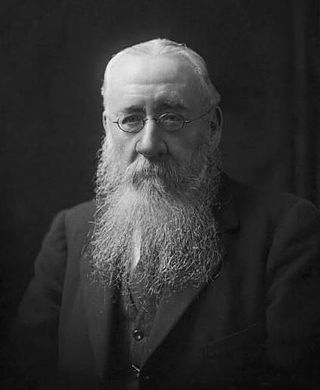
George Edward Bateman Saintsbury, FBA, was an English critic, literary historian, editor, teacher, and wine connoisseur. He is regarded as a highly influential critic of the late 19th and early 20th century.

Kenneth Lewis Roberts was an American writer of historical novels. He worked first as a journalist, becoming nationally known for his work with the Saturday Evening Post from 1919 to 1928, and then as a popular novelist. Born in Kennebunk, Maine, Roberts specialized in regionalist historical fiction, often writing about his native state and its terrain and also about other upper New England states and scenes. For example, the main characters in Arundel and Rabble in Arms are from Kennebunkport, the main character in Northwest Passage is from Kittery, Maine and has friends in Portsmouth, New Hampshire, and the main character in Oliver Wiswell is from Milton, Massachusetts.
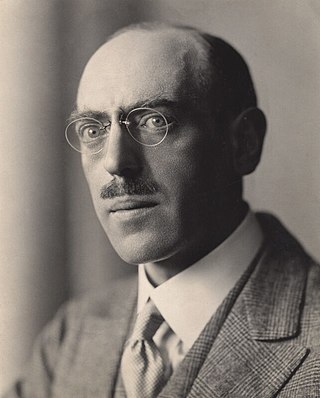
Walter Lionel George was an English writer, chiefly known for his popular fiction, which included feminist, pacifist, and pro-labour themes.

John Habberton was an American author and journalist.
Social criticism is a form of academic or journalistic criticism focusing on social issues in contemporary society, in respect to perceived injustices and power relations in general.

Blackwood's Magazine was a British magazine and miscellany printed between 1817 and 1980. It was founded by the publisher William Blackwood and was originally called the Edinburgh Monthly Magazine. The first number appeared in April 1817 under the editorship of Thomas Pringle and James Cleghorn. The journal was unsuccessful and Blackwood fired Pringle and Cleghorn and relaunched the journal as Blackwood's Edinburgh Magazine under his own editorship. The journal eventually adopted the shorter name and from the relaunch often referred to itself as Maga. The title page bore the image of George Buchanan, a 16th-century Scottish historian, religious and political thinker.
"Boys' Weeklies" is an essay by George Orwell in which he analyses those weekly story-paper publications for boys which were current around 1940. After being published in Horizon in abridged form, it was published alongside two of his other pieces in Inside the Whale and Other Essays from Victor Gollancz Ltd.
"Books v. Cigarettes" is an essay published in 1946 by the English author George Orwell. It compares the costs of reading to other forms of recreation including tobacco smoking.
"Second Thoughts on James Burnham" is an essay, first published in May 1946 in Polemic, by the English author George Orwell. The essay discusses works written by James Burnham, an American political theorist.

The bibliography of George Orwell includes journalism, essays, novels, and non-fiction books written by the British writer Eric Blair (1903–1950), either under his own name or, more usually, under his pen name George Orwell. Orwell was a prolific writer on topics related to contemporary English society and literary criticism, who has been declared "perhaps the 20th century's best chronicler of English culture." His non-fiction cultural and political criticism constitutes the majority of his work, but Orwell also wrote in several genres of fictional literature.

Nineteen Eighty-Four is a dystopian novel and cautionary tale by English writer George Orwell. It was published on 8 June 1949 by Secker & Warburg as Orwell's ninth and final book completed in his lifetime. Thematically, it centres on the consequences of totalitarianism, mass surveillance, and repressive regimentation of people and behaviours within society. Orwell, a staunch believer in democratic socialism and member of the anti-Stalinist Left, modelled the Britain under authoritarian socialism in the novel on the Soviet Union in the era of Stalinism and on the very similar practices of both censorship and propaganda in Nazi Germany. More broadly, the novel examines the role of truth and facts within societies and the ways in which they can be manipulated.
"Raffles and Miss Blandish" is an essay by the English writer George Orwell first published in Horizon in October 1944 as "The Ethics of the Detective Story from Raffles to Miss Blandish". Dwight Macdonald published the essay in politics in November 1944. It was reprinted in Critical Essays, London, 1946.

"Good Bad Books" is an essay by George Orwell first published in Tribune on 2 November 1945. After Orwell's death, the essay was republished in Shooting an Elephant and Other Essays (1950).
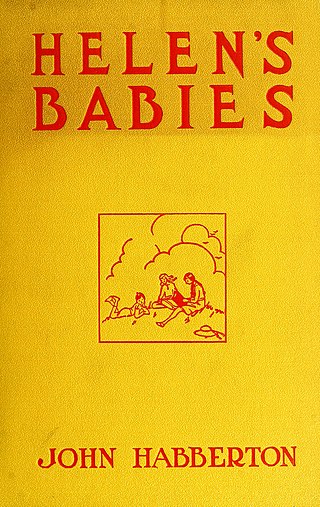
Helen's Babies is a humorous novel by American journalist and author John Habberton, first published in 1876.
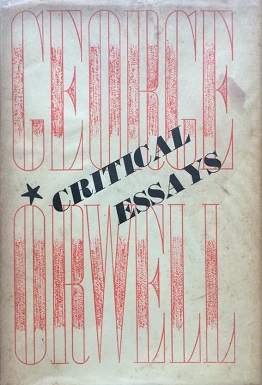
Critical Essays (1946) is a collection of wartime pieces by George Orwell. It covers a variety of topics in English literature, and also includes some pioneering studies of popular culture. It was acclaimed by critics, and Orwell himself thought it one of his most important books.
"Riding Down from Bangor" is a song, written by 1871, about a train journey from Bangor, Maine.
References
- 1 2 3 4 Orwell, George (1946). "Riding Down from Bangor". Fifty Essays. Project Gutenberg of Australia . Retrieved 18 November 2014.